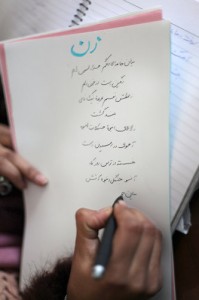
A poem that was copied at a Mirman Baheer meeting in Kabul. Seamus Murphy/VII for The New York Times.
There is a beautiful and moving article in today’s New York Times Magazine about Afghan women’s poetry. Written by Eliza Griswold, this extended piece looks at the Mirman Baheer women’s literary group, which meets at the Ministry of Women’s Affairs in Kabul — and particularly the women in rural Afghanistan who take great risks to call in and share there poetry. Mirman Baheer grew out of a literary network that met secretly under the Taliban, then known as the “Golden Needle,” where women shared writing while pretending to sew. But though the society is now above-ground and supported by the government, for many women writing poetry can still mean risking one’s life.
Griswold shows how in Afghanistan poetry and women’s power go hand in hand: “Pashtun poetry has long been a form of rebellion for Afghan women, belying the notion that they are submissive or defeated.” Their poetry often takes the form of the landai, a type of short “folk poem” traditionally written, even when done by men, in the voice of women, and covering topics from the bawdy to the political. Griswold quotes one parliamentarian as saying: “Landai belong to women…In Afghanistan, poetry is the women’s movement from the inside.”
I’ll let your read the rest for yourself, but let me leave you with this poem (called a rubaiya) by one of the women featured, which just killed me. It’s addressed to the Taliban:You won’t allow me to go to school.
I won’t become a doctor.
Remember this:
One day you will be sick.



